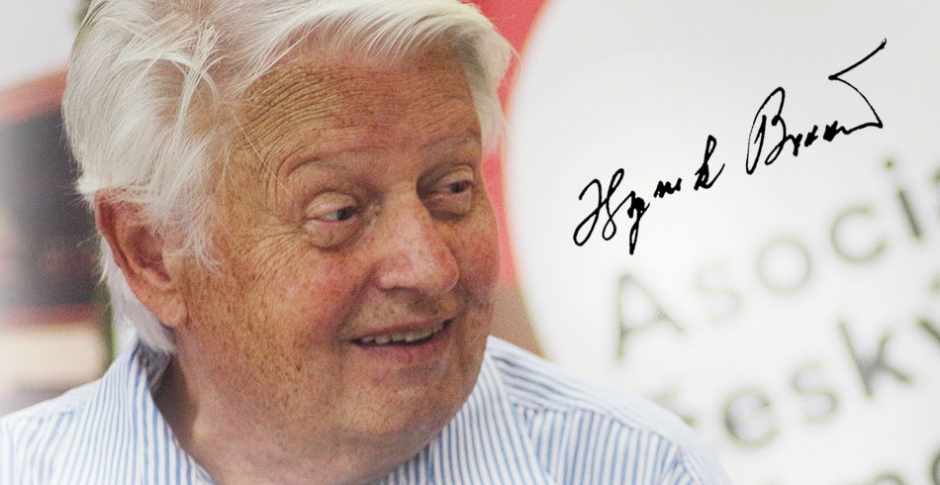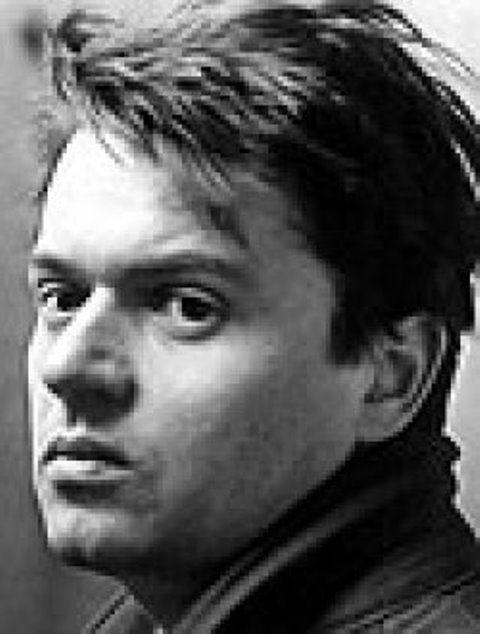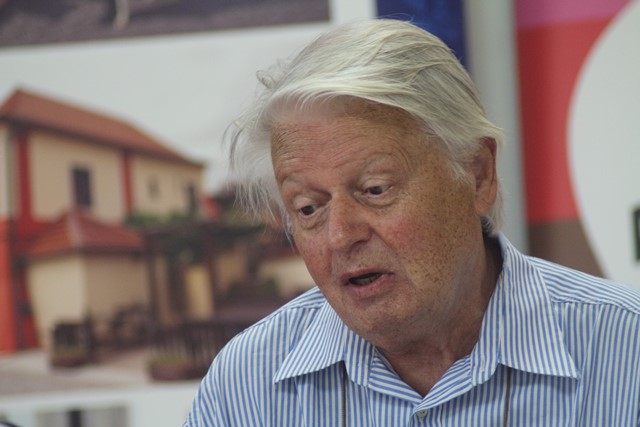Hynek Bočan - Filming fairy tale means freedom for me and freedom for actors
Written by Eva Csölleová, Vítek FormánekCzech director Hynek Bočan was born on 29.4.1938 in Prague and he belonged to up and coming Czech New Wave.We can find his name signed under big portion of films such as Pasťák, Parta Hic, Tvář za sklem, Smích se lepí na paty,S čerty nejsou žerty nebo Bumerang. At the lean time when film studio didn´t offer him any job he got hooked by TV and made lots of films and series. It was joy to talk to director who spent half of the century in film making business at Letní Filmová škola in Uherské Hradiště. He cooperated with real legends of Czech film and got tons of experience under his belt. When we had a chance we asked him some questions to which he duly replied.
How did you get into world of film? Were you supported by your parents?
My father has died when I was 12 years old. Death of the parents is always very tough and obviously influences kid certain way. But when father dies to son, it´s very hard, since there are certain things you just can´t tell your mum. It was hard time for me and I believe that life is full of chances which decide our destiny.
I went for camera tests of Jiří Sequens film Olověný chléb (Leaded bread) and I won them cos they tried some dirty tricks such as” how about your father, do you think of him often?” and I cried my eyes out and they aid” he is sensitive, he could play it” and I got a job. In that movie I joined pioneer organization and got the scarf by Commie director Otakar Krejča. That freed me since I have never been in that socialist organization but they all thought I was and they didn´t push me too hard. So you can see what funny chances life brings. If you sniff the film business at very young age it is very addictive, you don´t have to go to school, get some cash, so what´s the problem.
Why didn´t you stay acting and went behind camera and then occupied director´s chair?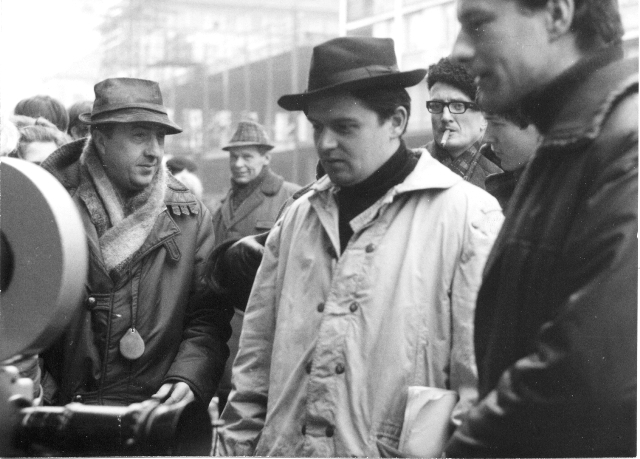
Director Sequens was an interesting person. He studied directing in Moscow at VKIK and had interesting working methods. When he wanted us- child actors to look sad, he didn´t give us any food so we were hungry.I also admired Mr. Novotný, who was a cinematographer there and Ladislav Helge was assistant director. He was my surrogated father at that time and it was him who pushed me towards the exams and thanks to him I decided to study a film directing.
How was it going at Film Academy (FAMU) for you?
I have interesting memory at that school. It was 60´s and you didn´t have to attend it if you couldn´t. Zdeněk Sirový, my mate and future director, asked me to excuse him for three days, since I will be making an advert for Fridex (anti frost liquid for the engine).He called me on fourth day and asked me if I could excuse him for another three days. I asked him why and he replied” You won´t believe that but they didn´t manage to obtain that Fridex”
Every day we have watched three foreign films so I must have seen hundreds of them. Our teachers were such top artists as Otakar Vávra, Milan Kundera or Karel Höger.
How did fresh FAMU graduates get into business?
We started as assistant directors or second directors and after some 4-5 years we were approached by one of those creative groups from Barrandov studios and they offered us a job. Sadly this practice doesn´t exist today and I think it´s a big shame.
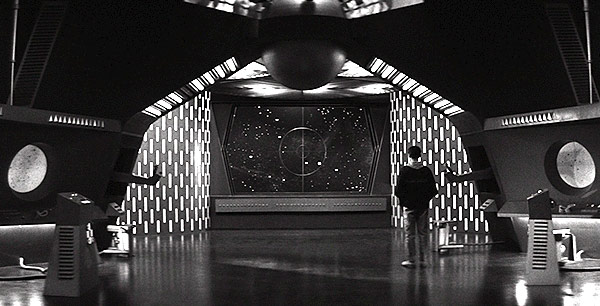 You were an assistant to great Czech directors Messrs. Weiss, Kachyňa and Polák. Did they teach you something which you used even when you were already established director?
You were an assistant to great Czech directors Messrs. Weiss, Kachyňa and Polák. Did they teach you something which you used even when you were already established director?
Yeah, you bet on that. Weiss was very special man and Kachyňa and Polák were brutal professionals, who took directing as a craft. Karel Kachyňa demanded perfect preparation and I learnt from him that technical script is the core of everything that every director has to have in his mind before he takes first take. I helped with shooting horrible movie” Pouta”(Bonds) starring Radovan Lukavský and Jiřina Švorcová.It was supposed to be filmed in autumn with leaves falling down the trees, but there were no leaves so Karel Kachyňa told the crew” Bočan graduated from FAMU, give him a ladder, he will make an autumn”. So I climbed up the ladder and was dropping the leaves artistic way onto main characters. I cooperated with Jindřich Polák on great movie “Ikárie XB1”.Kubrick liked that very much and it was kinda launching pad for him. I was responsible for spacesuits and all I had was one official photo of Russia cosmonaut and few photos of American astronauts. All mentioned directors were tough to me as their assistant but it was good for me since I learnt my craft well. They never excuse me anything and they didn´t give me anything for nothing. That was tough but good school.
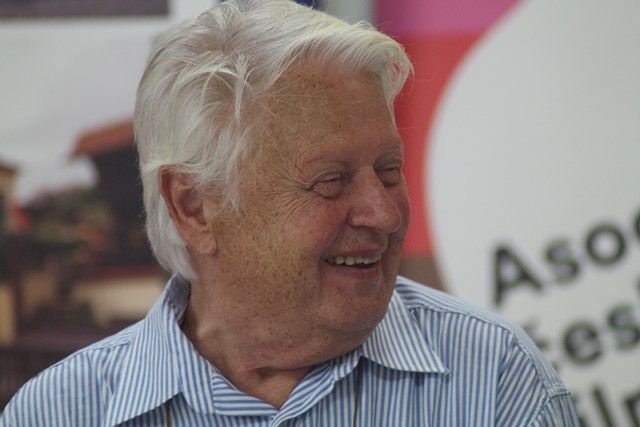
Once Mrs. Kalábová from one production group came to me and asked me if I would be interested in making full length feature movie with Pavel Juráček. So we went to Milan Kundera who was our teacher and told him about our intention to write a script based on one of his stories. He agreed and told us he won´t stay in our way. So we made a movie “ Nikdo se nebude smát”( Nobody will laugh).I was satisfied but Milan Kundera wasn´t, which often happens when author isn´t happy with the way his book was filmed. I won with this film a main price on festival in Mannheim and got the price of 10 000 marks. I was in the army at that time so I couldn´t go to the festival myself so they sent me a cheque. I, in my uniform, went to bank and set up the bank account. I bought a Cortina car for that.
How did you choose actors for your movies?
At that time there were no castings and it wasn´t usual that, say, six actors would be after one role and it would be tested, who is the best for that. So I usually visited the theatres and was looking for new faces. Casting was approved by creative group. That was the only thing they were poking their nose into. It lasted until 1968, after that they were poking their nose into everything. At that time the director got fixed month pay 1600 crowns and between 25 000-30 000 per film, so we didn´t get very rich at all.
Did you take filming a series “Záhada hlavolamu” (Puzzle mystery) as your personal tribute to writer Jaroslav Foglar, as something that you had to film or you were asked to make it?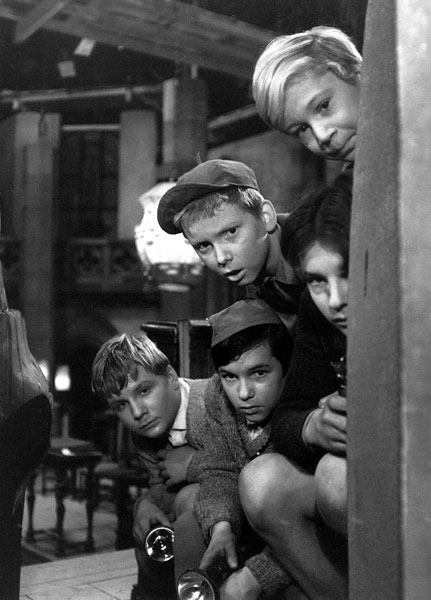
I have never been a scout but I was his enthusiastic reader. So I can agree that this series was a tribute to Jaroslav Foglar. Two years before that I made a documentary “ Tábor černého delfína” (Black dolphin´s camp) where he used to go with his team year after year. It was written by my friend Jiří Stránský. So Foglar knew me and we both thought about filming “Záhada hlavovamu”.At the edge of 1968/69 the normalization wasn´t that far yet, so it wasn´t banned yet. Year later I have read in my file “He made a series according to scout writer Jaroslav Foglar”.
Was it because of this series that you were banned from filming later on?
It didn´t come out of blue that someone would come and said I can´t make films. We still worked on scripts and films but at that time some people emigrated. So these phases got longer and longer and in all it took 5 years before I could make another film. In Barrandov studios there were about 50 directors and about 25 films were made each year so those commies made all of them. I took those 1600 crowns per month so it was hard to make ends meet.
After that I got a job as dubbing director and then came a movie called “Učedníci lásky”( Disciples of love) made by two stories written by Gustav Oplustil and Zdeněk Mahler who both had political problems so it was a chance for three of us after all those lean years. Then I was offered a movie “Parta hic” and script was re-written many times and then I said” Fuck it, I am not gonna make it”. But commies threatened me if I won´t make this I will never ever get a chance to make a film so I agreed since after not working for 5 years I was really hungry to make a movie. I hired great actors and film was watched by million viewers.
Was a movie “Bumerang” your own reconciling yourself with past regime that didn´t let you film movies you wanted to make or it was just good story which you wanted to film?
No, it´s not my personal reconciling with past regime. It was filmed according to story written by my good friend Jiří Stránský, so it´s his memory at that sad, dark time. It was very true story, which, when showed to our grandsons´ generation, they don´t believe it really happened. It was filmed under supervision of former inmates and when viewers asked Jiří Stránský” why did you do it worse than it was?”, he answered that IT WAS MUCH WORSE in reality than it is showed in the movie. The movie shows the things that truly happened and if someone says it´s bullshit, he can go and watch the movie to have second thought.
You made many nice movies and series. Did you have any “dream topic” you never filmed because during communism you couldn´t make it due to censorship and during capitalism you can´t due to lack of money?
Yes, with Ivan Klíma I have written a script which was called “Případ Doga”( Doga file).As I found out later, the script was read to journalist students as a proof that the contra-revolution did exist in Czechoslovakia. It wasn´t here but it was kind of Franz Kafka story which I never manage to film. Same went for fairy tale “ Dlouhý, Široký a Krátkozraký”( Long, wide and shortsighted) which belongs to second possibility since we were 25 million short in the budget.
You are very versatile director, which suited you more, serious dramas, comedies or TV series?
I don´t take it that way. Generally, the story must catch my imagination, it must get me interested. Once I get interested I don´t care anymore what kind of genre it is .It is really up to what the life offers me, but I believe that the atmosphere from shooting can be imprinted into that film.
What interests you on TV series, is it wider space to tell the story, versatility of the characters which you couldn´t cram into movie or that different kind of work?
I would say I was breast feed by series. I learnt to read, well letter by letter, in 1944.And straight after the war I started to read the books and there was a magazine call
“Vpřed” (Onward) and there were comics stories in it. So since my childhood I got to know this genre and it was always close to my heart. When I was kicked out from Barrandov in 1988 I was hired by TV and with it came the series.
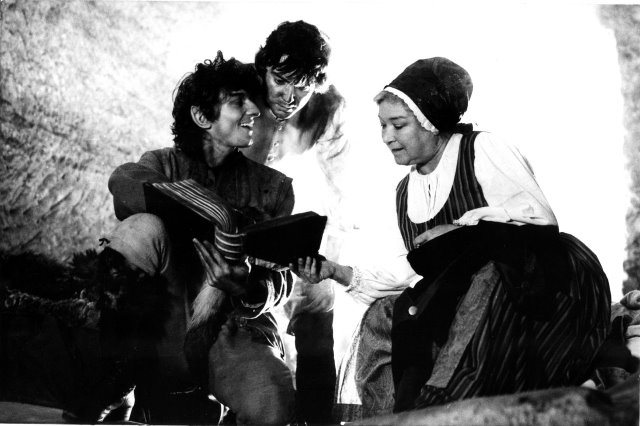 Your fairy tale” S čerty nejsou žerty”(There is no fun with devils) is one of the most popular here. Is making fairy tale a different job for director?
Your fairy tale” S čerty nejsou žerty”(There is no fun with devils) is one of the most popular here. Is making fairy tale a different job for director?
For me, filming fairy tale means freedom, since one can say more open things in it than in ordinary movie. Also it gives a freedom to actors and it is great joy to see them going off their artistic self and just enjoy making the movie and getting naughty.
Do you still attend film festivals?
I really do enjoy going to Uherské Hradiště for Letní filmová škola (Summer film school).They do a great deal of important job here, they show that film is part of our culture. If the state budget is to be cut down, first chunk goes off the culture budget. These days politicians look at film and culture with disdain and they don´t give a fuck really. But I observe that in Czech Republic the resistance wave was raised and people show and say these politicians “We need culture, it is good and we like it, so don´t you dare take it off us”. That healthy hard core of Czechs is defending it against politicians. It is great to see here so many people going to movies and discussing about the films. In Uherské Hradiště they do this for half a century and I keep my fingers crossed for them.
You have received many awards on festivals. Where do you have them displayed?
I have won many awards but not all of them got to me. Once I have won a Golden Coin in Venezia but it never reached me. It was in August 1968 and I wasn´t allowed to go there personally since they were afraid I could emigrate. With my fairy tale “S čerty nejsou žerty” I have won five festivals but not all prices got to me. I have Golden Nymph displayed in the cabinet and I also got a little figure from blind and handicapped kids and I wonder which of them has bigger prize. Emotionally they are both at the same level, they pleased me both the same but and I also remember that Out of sight means out of mind.
Half century ago Czech new wave was born. At present time a Czech movie is on low ebb. What would have to happen in order Czech film abroad would get back its high credit?
It is the same as if you would have asked me who will win the election next year, but in a way it is connected together. Who is in power decides where will the money go and today the film is very expen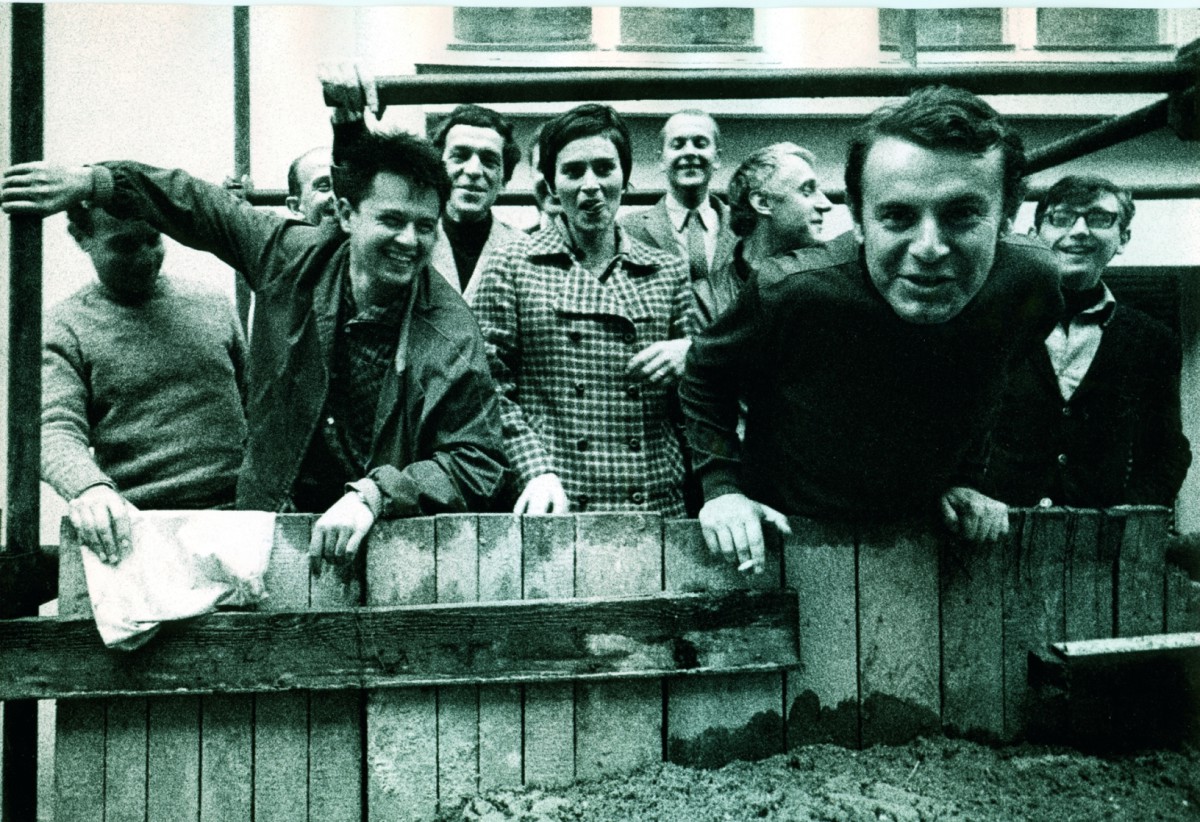 sive. I think firstly something would have to change at the schools. I wouldn´t want to abuse anyone but when we were students, our teachers were real aces of respective professions. I got an offer to teach at Film academy (FAMU) and my first question was, if I can fire a lazy student. I got a negative answer” No way, for Christ sake” so I declined the offer. I think there is a good crop of talented directors but trouble is the lack of quality scripts. I get a feeling that today they don´t make films about current time, about current problems. We made films in 60s and whatever annoyed us, we had the feelings we have to shout it out loudly. That doesn´t exist today, probably all are happy with everything. Young graduates try to learn first how to make adverts since that is where they can earn quick bucks but that is not about film making. That is about the story. Czech new wave was born as a complex of good luck. Many directors were banned from shooting and there was nobody to do it and at that very moment we left the film academy. We had common enemy- commies so it was US and THEM. Current generation doesn´t have that problem, their biggest problem is how and where to get money for the film. They devote great deal of time and energy to it which they lack in artistic way afterwards. We helped each other, we let others to read our scripts, which also doesn´t exist today for everybody is scarred that somebody else would nick his idea. And also, critic in those days also praised our films, they supported us, they loved us. Today, any critic who never made anything by himself only criticize and criticize, he never praise. I don´t get that.
sive. I think firstly something would have to change at the schools. I wouldn´t want to abuse anyone but when we were students, our teachers were real aces of respective professions. I got an offer to teach at Film academy (FAMU) and my first question was, if I can fire a lazy student. I got a negative answer” No way, for Christ sake” so I declined the offer. I think there is a good crop of talented directors but trouble is the lack of quality scripts. I get a feeling that today they don´t make films about current time, about current problems. We made films in 60s and whatever annoyed us, we had the feelings we have to shout it out loudly. That doesn´t exist today, probably all are happy with everything. Young graduates try to learn first how to make adverts since that is where they can earn quick bucks but that is not about film making. That is about the story. Czech new wave was born as a complex of good luck. Many directors were banned from shooting and there was nobody to do it and at that very moment we left the film academy. We had common enemy- commies so it was US and THEM. Current generation doesn´t have that problem, their biggest problem is how and where to get money for the film. They devote great deal of time and energy to it which they lack in artistic way afterwards. We helped each other, we let others to read our scripts, which also doesn´t exist today for everybody is scarred that somebody else would nick his idea. And also, critic in those days also praised our films, they supported us, they loved us. Today, any critic who never made anything by himself only criticize and criticize, he never praise. I don´t get that.
Thank you very much


